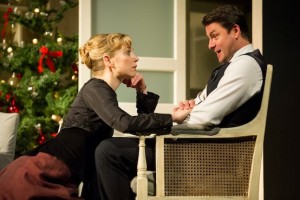First impressions of Nora
Ibsen manages to portray Nora as a carefree, conceited, childish wife in the beginning of the play. She is shown as incredibly materialistic and self obsessed. Her nature is portrayed in the way she allows her husband to address her in such a condescending tone. He uses strange pet names for her and and treats her like a little child. I feel like, because of this, she acts juvinial, and the attitude of her husband causes her to try and prove herself to him and show him how responsible she can be.
We can also see how cheeky and untrustworthy she really is. An example of this is how she tries to hide the fact that she was eating macaroons when she wasn’t allowed. This portrays how she tends to keep information from her husband.
Her conceited nature is seen when her friend arrives, whom she has not spoken to for 10 years. It is astounding how Nora cannot stop speaking of her own wonderful life and showing off to a woman who has suffered so much, whom she calls her friend.
Nora also appears to be obsessed with money, and keen on spending it. So much so that she even borrows money to satisfy her wants (without her husband’s permission). Also, all she wants is money from her husband, and doesn’t care much about his love and affection.


